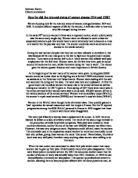O’Brian believes there were “huge costs” on the British (which he later admits were not so great in his reply), on the British Taxpayer to maintain the colonies which was an unfair burden as it distorted the allocation of investable funds as well as increasing the threats to war, as funds could have been spent on more worthwhile projects and war could have broke out in India before 1947. O’Brian believes, unlike Kennedy that India could have been traded with like any other country like France, Spain, United States and even Brazil.
Kennedy refutes this in his debate by claiming “if we were to leave Australia or the Cape, we should continue to be chief customers”, “were we to leave India, they would have no customers at all; for falling into anarchy”. It is believed by him that Britain was there to maintain its own trade and India and Raj needed to have Britain to subsidise them in their infrastructure and trade.
Other arguments revolve around the costs of Britain’s military and the facts around the perceived threat to Britain’s security.
O’Brian’s table four shows taxes collected in the United Kingdom were higher than any other country in Europe, and by a “considerable margin”. This table also shows military expenditure was also considerably more also though the standard of living and incomes per head were higher therefore the British taxpayer had more money to afford these taxes. O’Brian’s estimated figures suggest French and German incomes per head amounted to seventy percent of British taxpayers, with military expenditure per capita at forty-eight percent. This shows military expenditure was low considering vast empire that needed to be controlled but this money could have been spent elsewhere. O’Brian reiterates this point by comparing fully independent countries with those of India and claims that British Taxes could have been cut by forty percent further. This is contrary to Kennedy’s figures that state that Britain found it easier to be a great power with 3.4% of national income spent on armaments compared to 6.3% of Russia and 4.8% in France.
This shows an obvious weakness as both writers have contradicting sources of which they have based their case upon. O’Brian in his reply states that Kennedy’s sources are inaccurate and out of date with the latest research, and furthers his case with table two containing an index of military expenditure. Other weaknesses include the fact he has only reflected on a variety of secondary sources with little or no achieve research. This limits how useful you can determine his sources are as he can manipulate the information that he has to suit his argument. However it provides a good source of debate among other authors who can challenge the work. O’Brian has used many authors to back up his argument. A strong point from Kennedy is that expenditure was big but in real terms it wasn’t due to the higher standard of living British Taxpayers had. On the other hand there are many ways to interpret the figures thus easy to manipulate as found in O’Brian’s case. Kennedy also looks in hindsight which can be a weakness. At the time people regarded France and Russia to be the greater threat, which wasn’t the case in 1914. Therefore errors with expenditure and tactics to counter threats could easily be made due to wrong information at the time.
Both articles are very valid opinions in determining the costs and benefits in this debate, and allowing other authors to investigate the two versions. O’Brian appears to be the weaker argument though. It agrees with Hobson’s analysis that empire represented an increasingly costly alternative to social reform and to structural changes within the domestic economy.
Kennedy stated taxes raised were not the same across Germany or any other part of Europe there were different circumstances in each country. In fact imperialism didn’t cost much in real terms and therefore I believe that even though there was a cost and it could have been spent elsewhere, Britain maintained stability on its own borders and it was a cost it could afford given the current climate
Bibliography
*Patrick O’Brian, The costs and Benefits of British Imperialism 1846-1914; Past and Present 120 (1988) pp 163-200.
*Paul Kennedy, The costs and Benefits of British Imperialism 1846-1914; Past and Present 125 (1989) pp 186-192.
*Patrick O’Brian, The costs and Benefits of British Imperialism 1846-1914; Past and Present 125 (1989) pp 192-199







